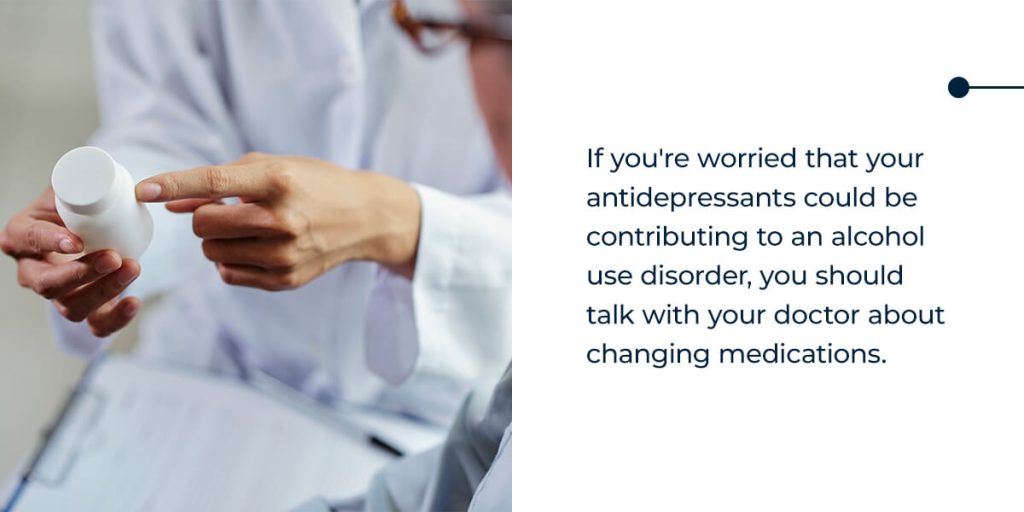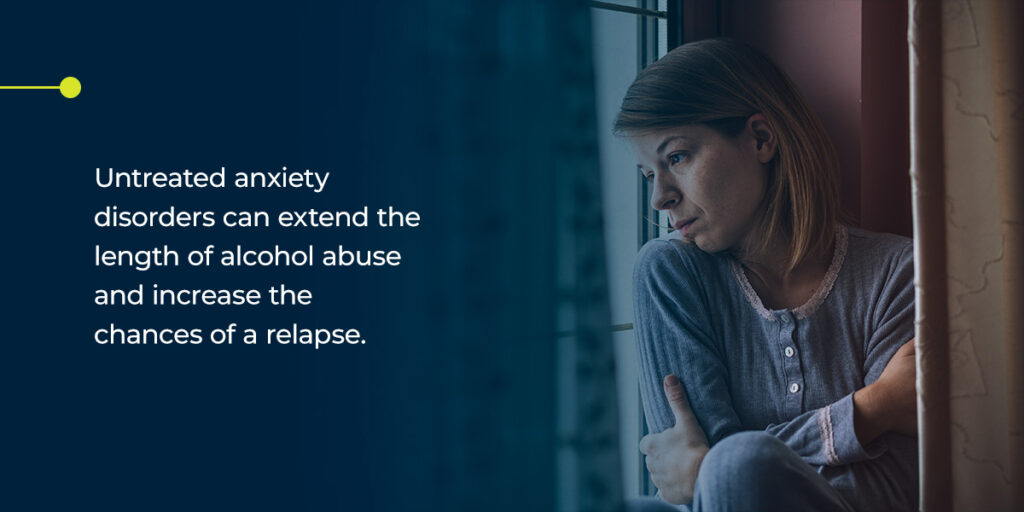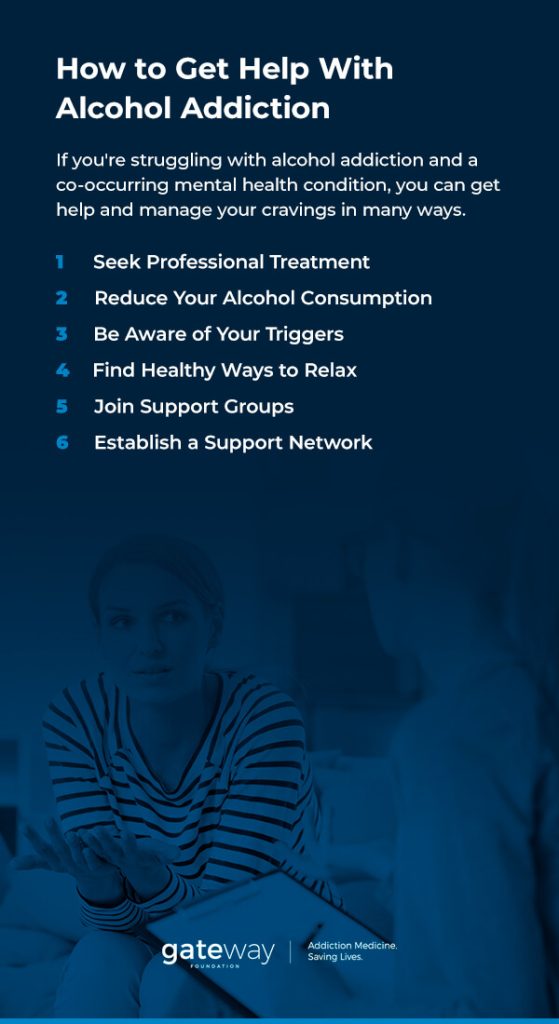- Mar 16
- Addiction
People often use substances to cope with their mental health symptoms. Alcohol is one of the most widely available substances, and a drinking culture exists in the United States where drinking is encouraged and even sensationalized. People who drink alcohol to cope with their mental health conditions have a greater chance of developing an alcohol use disorder (AUD).
Below, we’ll discuss mental health, the harmful use of alcohol and how you can overcome co-occurring disorders and find relief.
How Alcohol Impacts Your Mental Health
Alcohol has numerous effects on the body, and the hangovers after a night of drinking can cause symptoms such as:
- Headaches
- Nausea or vomiting
- Light and sound sensitivity
- Fatigue
- Muscles aches and pains
Many of these symptoms occur because alcohol is a diuretic, which encourages water loss through urine and causes dehydration. Dehydration contributes to most hangover symptoms, especially if you forget to hydrate while you’re drinking. Long-term alcohol use can also affect the liver, kidneys, heart and brain.
While alcohol’s physical effects can be severe and should be an essential part of the discussion about alcohol addiction, it’s vital not to forget the mental health side of things.
There is a correlation between mental health and substance use. Many people with AUDs drink to cope with their mental health symptoms. Alcohol provides a temporary sense of calm, but mental health symptoms can worsen once alcohol is out of the system.
Alcohol is a depressant that affects the production of serotonin and dopamine, which are the “happy” hormones. Once you wake up after a morning of drinking, you can experience post-alcohol anxiety and depression. If you already have anxiety or depression, alcohol can make your symptoms worse the day after drinking. Long-term alcohol use can create even more intense mental health symptoms.
Binge drinking will also make mental health issues worse. Binge drinking is classified as five or more drinks in a night for men and four or more drinks for women. Drinking too much alcohol can cause serious physical and mental health problems that can create additional issues on top of a substance use disorder.
If you don’t have any preexisting mental health conditions, overall alcohol use can induce anxiety, depression and memory loss. Even if you start drinking without these mental health disorders, there’s a risk of developing them from alcohol consumption. Once these conditions form, continuing to drink will only worsen the symptoms.
The stigma surrounding mental health problems makes it challenging for individuals to want to start treatment. There is no shame in asking for help when you need it, and you can significantly improve your quality of life by talking with a professional about your conditions. Seeking treatment for co-occurring disorders can also increase your chances of recovery.

Alcohol and Depression
Depression, otherwise known as major depressive disorder (MDD), is a mental illness that impacts how you think and feel. The way depression makes you think influences how you act. Untreated depression can cause serious physical, psychological and emotional problems and impact your ability to function at home, school or work. When you add alcohol into the mix, it can intensify these feelings.
People with an AUD are 3.7 times more likely to have co-occurring MDD, the most common mental health condition among people with an AUD. Part of the reason for this is that depression is one of the most common mental health conditions among the general population, not just people with a substance use disorder.
Alcohol affects nerve-chemical systems, which regulate our mood. Post-alcohol depression can appear in people after a heavy night of drinking, which is accompanied by symptoms such as:
- Difficulty concentrating
- Fatigue
- Feelings of hopelessness or helplessness
- Irritability
- Self-harm or suicidal thoughts
- Loss of interest in hobbies
- Loss of appetite
- Sleep disturbances
- Headaches
- Body aches
Some of these signs overlap with hangover symptoms, such as headaches and body aches. Drinking alcohol can make depression symptoms worse the following day as the body tries to recover from a hangover. Long-term alcohol use can increase the symptoms of depression and lower your inhibitions, making it easier to act on dangerous thoughts.
Some people believe that drinking more is a good idea to self-medicate since it temporarily relieves some of the uncomfortable depression symptoms. However, excessive drinking will only make the symptoms worse once the alcohol’s effects have worn off.
If you’ve been diagnosed with depression and take antidepressants, drinking can increase the side effects. Some research shows that certain antidepressants can increase the chance of relapse for those trying to reduce their alcohol consumption. If you’re worried that your antidepressants could be contributing to an alcohol use disorder, you should talk with your doctor about changing medications.
By reducing the amount of alcohol you consume or stopping drinking altogether, you can improve many of the symptoms of depression. If you’re dealing with an AUD and depression simultaneously, you should seek professional treatment for both of these conditions. In many cases, mental health conditions are the underlying cause of substance misuse. In others, substance use causes depression and other mental health conditions.
Rather than treating the substance use alone, addressing these conditions simultaneously can improve your chances of recovery and reduce the risk of relapse. Depression and substance use can be treated with various methods, such as:
- Psychotherapy
- Medication
- Lifestyle changes
- Hospitalization and treatment centers
- Support groups
When you’re ready to start treatment, a professional can help you determine what treatment option is best suited to your individual needs. A personalized treatment program will increase your chances for a successful recovery.

Alcohol and Anxiety
Around 19% of U.S. adults had at least one form of anxiety in the last year. Additionally, 31% of people experience some form of anxiety at some point in their lives. There are multiple kinds of anxiety disorders, including:
- Generalized anxiety disorder
- Panic disorder
- Obsessive-compulsive disorder
- Post-traumatic stress disorder
- Social anxiety disorder
- Agoraphobia
There are many key differences between these disorders, but they each share feelings of anxiety and resulting behavioral changes or disturbances. There are also overlapping symptoms between each of these disorders, which can present themselves as:
- Chest pain
- Rapid heartbeat
- Excessive sweating
- Shortness of breath
- Dizziness
- Choking sensations
- Nausea
- Tremors
People with anxiety often try to find ways to self-medicate and find relief from their symptoms. Some people turn to alcohol since it has a temporary calming effect on the body. However, alcohol can aggravate anxiety symptoms once the effects have worn off and a hangover kicks in. This phenomenon might lead a person to drink more to feel better, but it increases the chances of an AUD.
If a person develops an alcohol dependence while struggling with anxiety, their anxiety symptoms can worsen over time. They might start drinking even more to calm their anxious feelings, which can seriously affect their physical, mental and emotional health.
Untreated anxiety disorders can also extend the length of alcohol abuse and increase the chances of a relapse. Withdrawal symptoms can make a person feel anxious and uncomfortable, even if they don’t have an anxiety disorder. For people with anxiety, these feelings are magnified, making it more challenging to quit drinking successfully.
If someone who drinks doesn’t have an existing anxiety disorder, it’s possible to develop one from excessive drinking. Post-alcohol anxiety can turn into a longer-lasting condition requiring professional treatment.
If you’re struggling with anxiety and alcohol dependence, it’s essential to seek treatment for both of these conditions at the same time to treat the underlying cause. Simultaneous treatment increases your chances of a successful recovery. Some common treatments for anxiety and AUDs include:
- Exposure therapy
- Support groups
- Lifestyle changes
- Mindfulness training
Some people will see more benefits with different treatment types or a combination of them. You can reach out to a professional for help if you’re trying to determine the best treatment method for you.
Alcohol and Self-Harm/Suicide
The World Health Organization (WHO) estimates that 1 million people commit suicide each year, and suicide is the 11th leading cause of death in the United States. Mental health conditions are associated with most suicide cases, and AUDs can increase the risk of suicide or self-harm. According to the Archives of Suicide Research, as many as 63% of completed suicides suffered from substance use disorder, mainly AUDs.
Certain mental health conditions, such as depression, increase the chances of self-harm and suicidal ideation. Drinking is known to magnify the symptoms of these conditions, making these urges stronger. Alcohol can lead to self-harm and suicidal thoughts, even if a person has no existing mental health conditions. This substance lowers inhibition and makes people more likely to act on their thoughts.
People who binge drink are at a higher risk for suicidal thoughts and are more likely to act on these than other individuals due to alcohol’s effects, which cause poor judgment and other cognitive impairments.
Suicidal ideation and AUDs are very treatable, and a treatment center or drug rehabilitation program can help a person overcome these thoughts and lead a life of sobriety. If you or a loved one are experiencing thoughts related to self-harm or suicide and experience alcohol dependence, seek help from a qualified professional.

How to Get Help With Alcohol Addiction
If you’re struggling with alcohol addiction and a co-occurring mental health condition, you can get help and manage your cravings in many ways. Addiction treatment isn’t a one-size-fits-all situation. Some treatments will work better for certain people than others.
A successful recovery requires dedication to your chosen treatment method. If you’re unsure what type of treatment would work best for you, you can always talk with a professional for recommendations based on your circumstances.
Seek Professional Treatment
If you have an alcohol addiction, a professional treatment center can help you take the necessary steps to reach recovery. At Gateway Foundation, we offer dual diagnosis treatment, which focuses on treating co-occurring disorders to improve the chances of recovery and prevent future relapse.
We have different care levels that vary by intensity to treat your individual needs. These treatments aim to impact both conditions and assist people in building healthy coping mechanisms to help patients maintain sobriety and manage their mental health symptoms. We can also work with you to develop a personalized treatment plan to suit your unique needs.
Reduce Your Alcohol Consumption
You can start to reduce your alcohol consumption on your own by limiting yourself to one drink with dinner. After doing this for a while, you can begin to resist the urge to drink when you get home at night to slowly build the habit of not drinking.
Keep a diary of your alcohol consumption to monitor your progress during this time. You’ll be able to set goals and make changes to your current system as needed.
Be Aware of Your Triggers
If you’re recovering from alcohol addiction, you’ll want to know what your triggers are. If you feel the urge to drink in specific environments, such as bars or parties, try finding a new place to socialize, such as a coffee shop or movie theater. If you feel the urge to drink in stressful situations, such as difficulty at work or in your relationships, find healthy coping mechanisms to help you channel your urges into something productive.
Find Healthy Ways to Relax
Many people drink alcohol to relax and find relief from their mental health symptoms. Instead of drinking, look for healthier ways to relax. You can start practicing yoga, meditating, engaging in physical activity, cooking or taking a calming bath. Activities like these can help take your mind off stressful situations and provide you with an outlet to release tension rather than choosing to drink.
Join Support Groups
Support groups, such as Alcoholics Anonymous (AA), are an excellent way to connect with others who have gone through or are currently going through the same situation you are in. You can discuss your feelings, ask questions and vent about some of the challenges you’re experiencing.
These groups can also help hold you accountable after you’ve finished a treatment program. Attending meetings regularly can help prevent future relapse and offer new ways to relax and cope with your mental health symptoms.
Establish a Support Network
Having a robust support network in your personal life can help you with alcohol addiction. Fill your support network with people who encourage your sobriety and hold you accountable through every step of the recovery process. You can rely on your friends or family members when you feel the urge to drink and reach out when you’re struggling or experiencing one of your triggers.

Seek Treatment for Alcohol Addiction and Mental Health Disorders With Gateway Foundation
Alcohol addiction is harmful to your physical, mental and emotional health. If you’re struggling with a mental health condition and drink alcohol, you could be making your symptoms worse. Recovery from alcohol misuse and mental illness is possible. At Gateway Foundation, we’re dedicated to providing you with quality treatment to help you manage your symptoms and improve your quality of life.
We have over 50 years of experience in the Illinois area. We have multiple treatment facilities across the state so that you can seek recovery close to home. If you’re ready to take the first step toward recovery, contact us today to learn more about our treatment programs and services.


